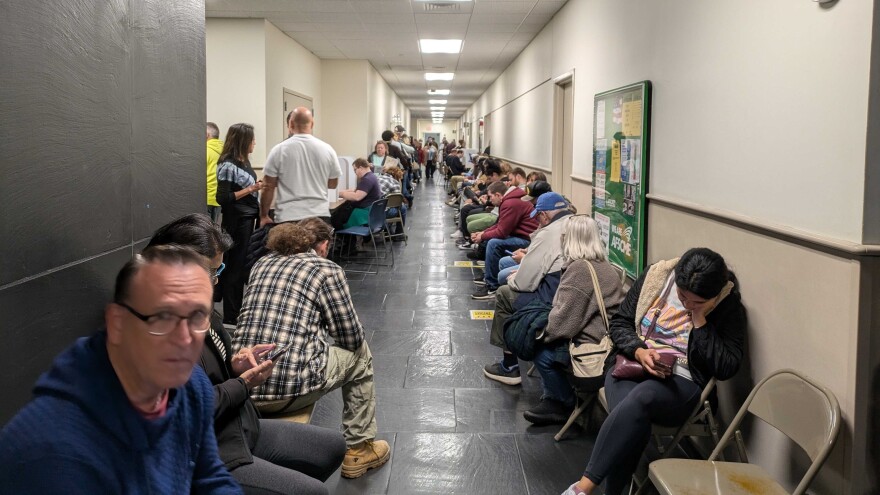ALLENTOWN, Pa. — Pennsylvania's 2024 election operated like a well-oiled machine this year with no major delays or snafus, but Lehigh County's top election official warned there's still trouble under the hood.
For years, state and county officials have requested tweaks to Pennsylvania's election code: more time to pre-canvass mail-in ballots and an earlier voter registration deadline.
Other requests, such as a more robust form of early, in-person voting, have cropped up since.
But thanks in part to political gridlock and the politicization of elections, none of the changes have gone on the books.
"I don't know how long it's sustainable on the human side of it."Lehigh County Chief Clerk of Elections Tim Benyo
The end result is a successful election that is driving away experienced administrators, Lehigh County Chief Clerk of Elections Tim Benyo said.
And when inexperienced people are forced to step into bigger roles, it increases the odds of a major problem.
"I don't know how long it's sustainable on the human side of it," Benyo said. He's currently interviewing for a new deputy after his last one resigned following the election.
So far, lawmakers and government officials have thrown money at the problem.
After Pennsylvania took days to tally the 2020 election results, lawmakers provided counties with millions of dollars to buy more and faster machines to count the ballots.
Lehigh County and others have ratcheted up overtime so their election offices can accomplish all their work within the state-approved timeline.
New challenges are popping up
Benyo expressed gratitude for the tools he's been given, but said in an interview last week that the support amounts to a Band-Aid on a deep wound.
In the final 14 days before this year's election, Benyo said his 10 full-time employees worked around the clock to process voter registration forms, prepare electronic poll books, respond to mail-in in ballot requests and train hundreds of poll workers.
"I don't think it's sustainable for offices to have people working 80 hours [of overtime] in a two-week pay period. One hundred and sixty hours in two weeks is too much."Lehigh County Chief Clerk of Elections Tim Benyo
"I don't think it's sustainable for offices to have people working 80 hours [of overtime] in a two-week pay period," Benyo said. "One hundred and sixty hours in two weeks is too much."
And new challenges are popping up.
In the past, it wasn't uncommon for people to wait up to an hour if they requested a mail-in ballot in person. Over-the-counter ballots are popular among people who want to vote early but have concerns about mail delivery or drop boxes.
But the demand for over-the-counter ballots spiked this year, leading to hours-long waits at peak hours.
Benyo said the state's voter database, SURE, slowed as officials across the state tried to access it. At peak usage, it took 20 minutes to determine if a single applicant was registered to vote, Benyo said.
(The state has allocated resources to update the database and is currently seeking proposals, Benyo said.)

'Some heated arguments'
The long waits and lingering doubts of election integrity in some voters' minds led to testy moments, Benyo said.
Some voters expected to vote on the county's standard paper ballots and became upset when they were handed a mail-in ballot, he said.
"Everything gets condensed into those two weeks. It's just more stuff in a smaller window."Lehigh County Chief Clerk of Elections Tim Benyo
Benyo said he would show voters the cage where mail-in ballots would be secured in an effort to ease their concerns, but it didn't always work.
"There were some heated arguments in the hall when everybody was trying to vote," Benyo said.
In all, it's another stressor in an election season crammed full of them.
Benyo said election officials are gathering ideas from other states for potential alternatives, such as allowing early voting with normal voting machines.
He said he'd be grateful for any improvement that gives his team a moment to breathe.
"Everything gets condensed into those two weeks," he said. "It's just more stuff in a smaller window."
Benyo isn't hopeful lawmakers will move toward solutions in 2025, citing recent history.
Room for compromise
When the General Assembly reconvenes in January, it will have the same partisan divides seen over the past two years — the slimmest possible Democratic majority in the House and a narrow but firmly entrenched Republican majority in the Senate.
House Democrats narrowly passed a bill in May that would have let election workers begin scanning mail-in ballots through a computer up to seven days before Election Day.
"I am deeply worried it will be the same song and dance unless they get their pound of flesh, which is overly restrictive voter ID."State Rep. Michael Schlossberg
However, the bill went nowhere in the Senate. In the past, Republicans have tied the pre-canvass change to creating voter ID, which has been unpopular with many Democrats.
State Rep. Michael Schlossberg, D-Lehigh, and the incoming House majority whip, wasn't sure whether election reforms would be in the cards in 2025.
He said he was not aware of any dialogue on the issue between House and Senate leadership on election reform, though it could be occurring, he said.
He said he believed there is room for compromise if the two sides were willing to meet in the middle.
For Democrats, that likely would mean agreeing to some form of voter ID, while Republicans would accept the tweaks to the election code that would further entrench mail-in voting.
"I am deeply worried it will be the same song and dance unless they get their pound of flesh, which is overly restrictive voter ID," Schlossberg said.


